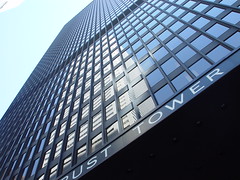I ran across this commentary by Lou Gelfand in the Star Tribune earlier this week about a recent Home Depot shareholders meeting and was horrified by the description of what occurred at a recent Home Depot shareholders meeting and the subsequent response by the public relations representative:
Chief Executive Robert Nardelli…was accompanied on the stage by two unidentified people and two large digital timers.
The New York Times account (subscription req.) noted that Nardelli invited comments from shareholders with the caveat, “Questions are limited to one minute and one person.” As the first person rose, the timer started counting down. The timer hit zero as he spoke and the microphone was shut off.
The Times account described “two big, burly men,” wearing Home Depot aprons, “who look as if they could be bouncers at a rowdy club.” They took a step toward the man. The man sat down.
The shareholders didn’t respond as desired, at the end calling for shareholders to have more say in setting executive pay. Nardelli recommended that the shareholders, “reject this proposal.”
Another shareholder felt the way that the way Nardelli had conducted the meeting was, as the Times reported, “really disturbing” and that “it really reflects what we have been reading in the press about the style of this board.”
The other shareholders burst into applause.
Obviously still in protectionist mode, the next day a letter to the Times (Sub. Req.) by Brad Shaw, Home Depot's senior vice president for corporate communications and external affairs, was published that defended against an article critical of how Home Depot sets its executive compensation.
But just a few days later, the company changed its tune about how it handled the shareholders meeting:
Consistent with the way we run our company – in which we listen, learn and lead – we will return to our traditional format for next year's annual shareholders meeting, which will include a business overview, the presentation of proposals, an opportunity for shareholder questions and with the board of directors in attendance,” said Bob Nardelli, chairman, president & CEO.
In protecting their compensation, Nardelli, and his PR council, conducted a shareholders meeting that didn’t have in mind the interests of their key stakeholders. In the end, the shareholder voted 41 to 59 percent against “a shareholder proposal regarding chairman and CEO.” (Talk about obfuscation)
So, the thing very they were trying to protect against by being heavy-handed found its way into the voting process anyway, and a majority of the stakeholders said, “no” we don’t want control over compensation (or whatever the “proposal regarding [the] chairman and CEO” actually was since it is so general in the release).
My thought is, “When will we start trusting our stakeholders?”
Personally, I think this kind of behavior can only harm the long-term health of a company and its executive team. And of you look at the recent performance of the stock, it seems to suggest that this incident didn't help them as it is at a new 52-week low, dropping after the stockholders meeting. Read the stock message boards and Nardelli is universally disliked.
In San Antonio, Texas, where I practice public relations, a Lowe’s and Home Depot are fighting it out on a corner near my house. I have long been a Home Depot customer, but this kind of behavior by senior management makes me wonder if the company can nimbly survive the current competitive atmosphere, one where the customer and the shareholders are taking on more of the power every day.
Since I don't own stock in either company, maybe this will help me make up my mind which corner I will visit most often.
